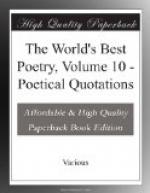“It is in this last shape that Burns presents himself.... Impelled by the expansive movement of his own irrepressible soul, he struggles forward into the general view; and with haughty modesty lays down before us, as the fruit of his labor, a gift, which Time has now pronounced imperishable.”
But why should one read poetry, at all, where there is so much good prose to be read? Herbert Spencer in his essay on “Style” gives some reasons for the superiority of poetry to prose. He says:
“Poetry, we shall find, habitually adopts those symbols of thought and those methods of using them which instinct and analysis agree in choosing, as most effective, and becomes poetry by virtue of doing this.
“Thus, poetry, regarded as a vehicle of thought, is especially impressive, partly because it obeys all the laws of effective speech and partly because in so doing it imitates the natural utterances of excitement. While the matter embodied is idealized emotion, the vehicle is the idealized language of emotion. As the musical composer catches the cadences in which our feelings of joy and sympathy, grief and despair, vent themselves, and out of these germs evolves melodies suggesting higher phases of these feelings; so the poet develops from the typical expressions in which men utter passion and sentiments those choice forms of verbal combination in which concentrated passion and sentiment may be fitly presented.”
And the language which Spencer regards as the “most effective” is tersely set forth by that poetic and spiritual preacher, Frederick W. Robertson, in his idea of poetry: “The natural language of excited feeling, and a work of imagination wrought into form by art.”
Another point in connection with the language of poetry is that, compelled by their limitations of rhythm, rhyme, and the compression of much thought and feeling into brief space, the poets have become the finest artists in the use of words. The examples of word-use in the dictionaries are largely drawn from the poets. Joseph Joubert, the French epigrammatist, says:
“Like the nectar of the bee, which turns to honey the dust of flowers, or like that liquor which converts lead into gold, the poet has a breath that fills out words, gives them light and color. He knows wherein consists their charm, and by what art enchanted structures may be built with them.”
Familiarity with poetry thus becomes to the attentive reader an insensible training in language, as well as an elevation of mind and spirit. Superiority of spirit and of form, then, offers good reasons why the intelligent—whether for stimulation, consolation, self-culture, or mere amusement in idle hours—should avail of a due proportion of this finest expression of the sweetest, the highest, and the deepest emotional experiences of life, in the realms of nature, of art, and of humanity itself.
A few words from the gifted William Ellery Channing the elder epitomize some striking thoughts on this subject:




